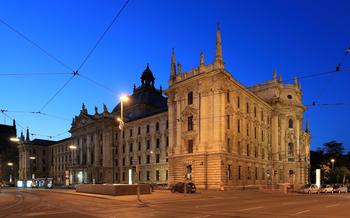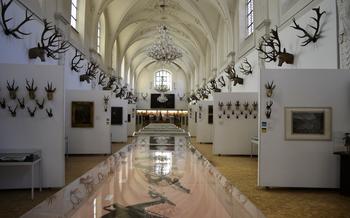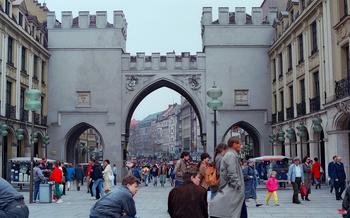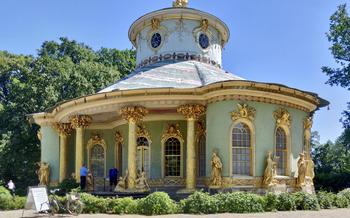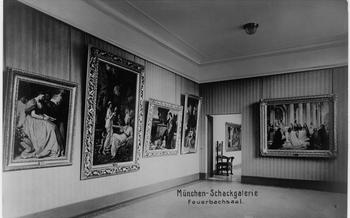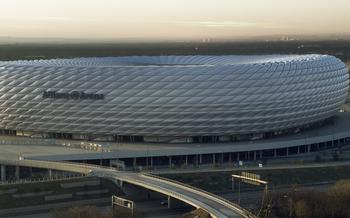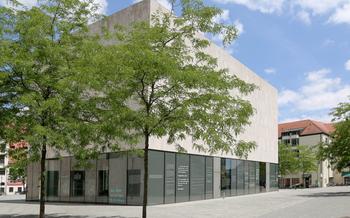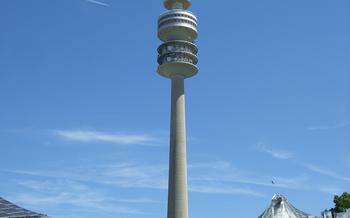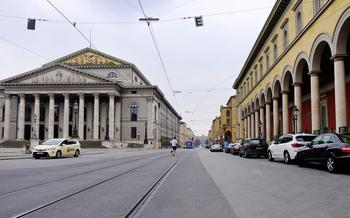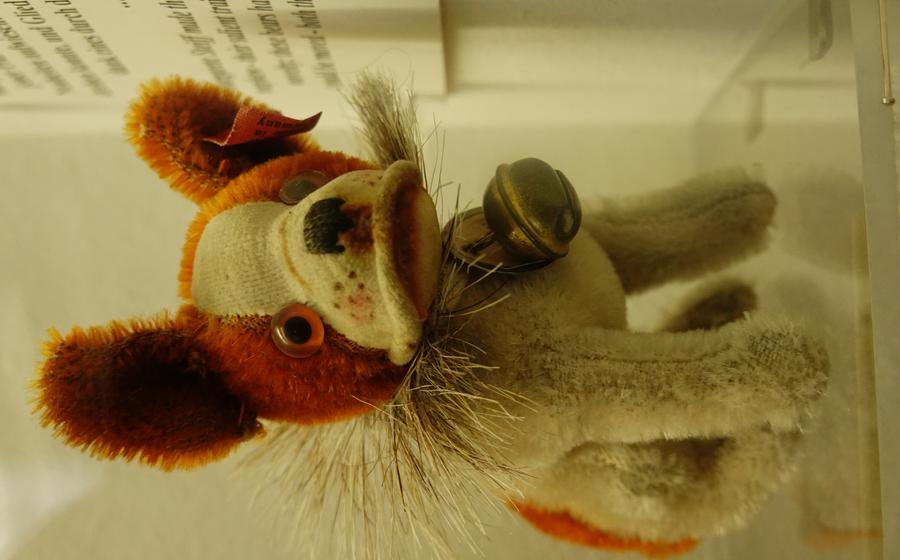
Toy Museum (Spielzeugmuseum)
- Historical Overview
- Location and Accessibility
- Hours of Operation and Admission Fees
- Exhibits and Collections
- Guided Tours and Programs
- Museum Gift Shop
- Accessibility for Families
- Educational Value
- Interactive Exhibits
- Temporary Exhibitions
- Photography and Social Media
- Accessibility for All
- Historical Toys
- Seasonal Events and Activities
- Insider Tip:
Historical Overview
Munich, renowned for its rich cultural heritage, holds a significant place in the toy industry. The city has nurtured a vibrant toy-making tradition for centuries, evolving into a global hub for toy production and innovation. In the 19th century, Munich emerged as a prominent center for toy manufacturing, with numerous workshops and factories producing a diverse range of toys, from wooden puzzles to intricate dolls. This thriving industry laid the foundation for the establishment of the Spielzeugmuseum, a treasure trove dedicated to preserving and showcasing the captivating history of toys.
Location and Accessibility
The Toy Museum (Spielzeugmuseum) is conveniently located in the heart of Munich, Germany, at Marienplatz This central location makes it easily accessible by public transportation, with several tram and bus lines stopping nearby. For those arriving by car, parking is available in the surrounding streets or at the nearby Marienplatz car park.
Hours of Operation and Admission Fees
The Toy Museum is open to the public from Tuesday to Sunday, from 10:00 am to 5:00 pm. During the summer months of July and August, the museum extends its hours and remains open until 6:00 pm. Visitors are advised to check the museum's website for any updates or changes in operating hours, especially during holidays.
Admission prices for the Toy Museum are affordable and designed to cater to visitors of all ages. A standard ticket for adults costs 6 euros, while children and teenagers between the ages of 6 and 18 years old are eligible for a reduced rate of 3 euros. Families can also take advantage of a special family ticket, which allows two adults and two children to enter for a combined price of 15 euros.
In addition to general admission fees, the Toy Museum offers discounted rates for students, seniors, and groups. Students with valid student IDs can purchase a discounted ticket for 4 euros, while seniors over the age of 65 are entitled to a reduced rate of 5 euros. Groups of 10 or more visitors can also receive a discounted rate, with prices starting at 4 euros per person.
For those who want a more immersive experience, the Toy Museum offers guided tours led by knowledgeable and enthusiastic museum guides. These tours provide visitors with an in-depth look at the museum's collection and offer insights into the history and significance of toys. Guided tours are available in German and English and must be booked in advance.
Exhibits and Collections
The Munich Toy Museum boasts a diverse array of exhibits that take visitors on a journey through the captivating world of toys. From historical treasures to contemporary innovations, the museum's collection showcases the evolution of toy design and the boundless creativity of toymakers. Highlights include a collection of rare and antique toys, such as a life-size wooden dollhouse from the 19th century and a miniature train set from the early 1900s.
Interactive exhibits are a key feature of the museum, encouraging children to engage with toys in a hands-on manner. Children can build their own dollhouse, experiment with different types of building blocks, and even design their own toys using 3D printers. These interactive experiences not only entertain but also stimulate imagination and cognitive development.
The museum also features a section dedicated to contemporary toys, showcasing the latest trends and innovations in the toy industry. Children can play with the latest video games, explore interactive digital toys, and learn about the science behind their favorite toys. The museum's collection is constantly updated to reflect the ever-changing world of toys, ensuring that there is always something new and exciting to discover.
Guided Tours and Programs
The Toy Museum Munich offers guided tours in both German and English, providing visitors with an opportunity to delve deeper into the fascinating world of toys and their history. These tours are led by knowledgeable and enthusiastic guides who share insights and anecdotes about the museum's collection, ensuring an enriching and engaging experience for all participants.
To enhance the learning experience for families and children, the museum also organizes special events, workshops, and educational programs throughout the year. These programs are designed to encourage creativity, hands-on exploration, and a deeper understanding of the toy-making process. From interactive storytelling sessions to hands-on craft workshops, there's something for every child to enjoy and learn from.
To ensure a spot in these guided tours or programs, advance booking is highly recommended. This can be done through the museum's website or by contacting their information desk directly. Walk-in options are also available, subject to availability, so visitors are advised to arrive early to avoid disappointment.
Museum Gift Shop
The Toy Museum's gift shop is a paradise for toy enthusiasts of all ages. It offers a wide variety of toy-related souvenirs, books, and educational materials that are sure to delight and inspire. Visitors can find unique items exclusive to the museum shop, such as replicas of historical toys, hand-crafted dolls, and educational kits. The shop also stocks a selection of classic toys and games, making it a great place to pick up a gift for a child or a nostalgic treat for yourself.
Payment methods include cash, credit cards, and debit cards. Tax refunds are available for non-EU residents who present their passport and a completed tax refund form.
Accessibility for Families
The Toy Museum in Munich is a haven for families with children of all ages. The museum's commitment to creating a welcoming and engaging environment for families is evident in its thoughtful design and amenities. Strollers are available for rent, making it easy to navigate the museum's spacious galleries with little ones in tow. Baby changing rooms and nursing areas are conveniently located throughout the museum, ensuring that parents can attend to their children's needs without disruption.
Furthermore, the museum features several child-friendly amenities that transform the visit into an enriching and enjoyable experience for the whole family. Play areas and designated activity zones provide dedicated spaces for children to engage in creative and educational activities. These areas are designed to encourage imaginative play and exploration, allowing children to fully immerse themselves in the world of toys.
To enhance the family experience, the museum offers a range of educational programs and workshops tailored specifically for children. These programs explore different themes related to toys, such as history, design, and creativity. Through hands-on activities and interactive demonstrations, children are encouraged to learn, create, and have fun simultaneously.
By catering to the needs of families, the Toy Museum in Munich creates a welcoming and stimulating environment that allows children to explore their imaginations, learn about the history of toys, and create lasting memories with their loved ones.
Educational Value
The Toy Museum in Munich is not just a place to admire and play with toys; it's also a hub for learning and inspiration. Through its vast collection of toys from different eras and cultures, the museum provides a unique opportunity for children to explore the history of play, the evolution of toy design, and the creativity that goes into making toys.
Interactive exhibits and hands-on activities encourage children to engage with the toys, stimulating their imagination and cognitive development. They can build their own toys, solve puzzles, and even dress up in period costumes, immersing themselves in the world of play and creativity.
The museum also offers educational programs and resources for schools and homeschooling families. These programs align with curriculum standards and provide teachers with tools and materials to incorporate toy-related activities into their lessons. By learning about toys, children can develop essential skills such as problem-solving, creativity, and collaboration, while also gaining a deeper appreciation for the cultural and historical significance of toys.
Interactive Exhibits
The Toy Museum Munich boasts an impressive array of interactive exhibits that bring toys to life and transform the museum into a wondrous playground. Children can engage in hands-on activities that stimulate their imagination and enhance their understanding of toys.
One of the highlights is the "Playful Past" exhibit, where kids can step back in time and experience traditional toys from different eras. They can try their hand at spinning tops, building with wooden blocks, or playing with tin toys, gaining insights into how children played in the past.
The "Toy Lab" is another popular area where young visitors can unleash their creativity and tinker with various materials to create their own toys. They can explore different techniques, test their designs, and take home their very own creations, fostering a sense of accomplishment and pride.
For those fascinated by technology, the "Digital Play" exhibit showcases interactive digital games and installations that blend the worlds of toys and technology. Children can immerse themselves in virtual reality experiences, play interactive games on touchscreens, or even design their own digital toys, encouraging curiosity and innovation.
These interactive exhibits are designed to engage children of all ages, making the Toy Museum a truly immersive and educational experience. They not only provide entertainment but also stimulate critical thinking, problem-solving skills, and creativity, leaving a lasting impact on young minds.
Temporary Exhibitions
In addition to the permanent exhibits, the Toy Museum also hosts a variety of temporary or rotating exhibitions that showcase unique themes or special collections. These exhibitions offer visitors the chance to explore different aspects of toy history, culture, and design.
Past temporary exhibitions have featured topics such as the history of board games, the evolution of dolls, and the toys of different countries around the world. The museum also collaborates with other institutions and organizations to present special exhibitions on specific themes or artists.
To stay updated on upcoming exhibitions and events, visitors can check the museum's website or follow them on social media. Temporary exhibitions are a great way to experience something new and exciting at the Toy Museum, and they offer a chance to see rare or unique toys that may not be on display in the permanent collection.
Photography and Social Media
Capturing the magic of the Toy Museum through photography is highly encouraged, as it allows visitors to preserve their memories and share their experiences with the world. The museum welcomes visitors to take photos and videos for personal use, provided that they do not disrupt other visitors or the exhibits. Flash photography, however, is not permitted, as it can damage the delicate toys and artifacts on display.
When sharing your photos and videos on social media, be sure to tag the museum and use relevant hashtags to connect with other toy enthusiasts and museum-goers. This not only helps promote the museum but also creates a vibrant online community where people can share their love for toys and appreciate the museum's collection.
For those looking to capture the best shots, here are a few tips:
- Natural Light: Take advantage of the natural light streaming through the museum's windows to create beautiful, well-lit photos.
- Composition: Experiment with different angles and perspectives to create dynamic and visually appealing images.
- Details: Focus on the intricate details of the toys, such as their unique designs, colors, and textures.
- People: Capture the joy and excitement of children interacting with the toys, adding a personal touch to your photos.
By following these tips, you can create engaging and shareable content that showcases the wonders of the Toy Museum and inspires others to visit this unique destination.
Accessibility for All
The Toy Museum in Munich is committed to providing an inclusive and accessible experience for all visitors, regardless of their abilities or needs. Wheelchair users and visitors with limited mobility will find ramps and elevators throughout the museum, ensuring easy access to all exhibits and facilities. The museum also offers audio guides in several languages, making it easier for non-German speakers to enjoy the exhibits. For visitors with sensory sensitivities, the museum provides a variety of sensory-friendly experiences, such as quiet rooms and low-sensory areas. The staff at the Toy Museum is always willing to assist visitors with any accessibility needs, ensuring that everyone has an enjoyable and educational experience.
Historical Toys
The Toy Museum Munich boasts an impressive collection of historical toys that serve as a testament to the evolution of toy design and the changing nature of childhood play. Among the highlights are intricate wooden toys from the 18th century, charming porcelain dolls from the Victorian era, and early 20th-century tin toys that spark nostalgia. These historical artifacts provide a glimpse into the past and showcase how toys have mirrored cultural and societal changes over time.
The museum's collection includes a rare collection of teddy bears, each with its unique story to tell. From antique Steiff bears to modern-day creations, these beloved plush toys have captured the hearts of generations and continue to hold a special place in the world of toys.
Preserving and showcasing these historical toys is of utmost importance, as they represent a tangible connection to our past and serve as a reminder of the enduring power of play. By exploring these timeless treasures, visitors can gain a deeper appreciation for the role toys have played in shaping childhood memories and fostering creativity and imagination.
Seasonal Events and Activities
Christmas Market: During the festive season, the museum transforms into a magical Christmas market. Visitors can browse stalls selling unique toys, handmade crafts, and delicious treats. Take advantage of the opportunity to experience the warmth and cheer of a traditional German Christmas market.
Summer Workshops: In the warmer months, the museum offers a variety of workshops for children. These workshops focus on toy-making, arts and crafts, and hands-on activities. It's a great opportunity for kids to unleash their creativity and learn new skills.
Special Exhibitions: Throughout the year, the museum hosts special exhibitions that showcase unique toy collections or explore specific themes. These exhibitions offer a chance to see rare and unusual toys, as well as learn about the history and significance of different types of toys.
Insider Tip:
Venture beyond the main exhibits to discover hidden gems like the museum's extensive doll collection, tucked away in a cozy corner. For a unique souvenir, pick up a hand-crafted wooden toy made by local artisans, available exclusively in the museum shop. Before you leave, stroll down Sonnenstraße, a charming street lined with toy stores, boutiques, and cafés, where you can continue your toy-themed adventure.
